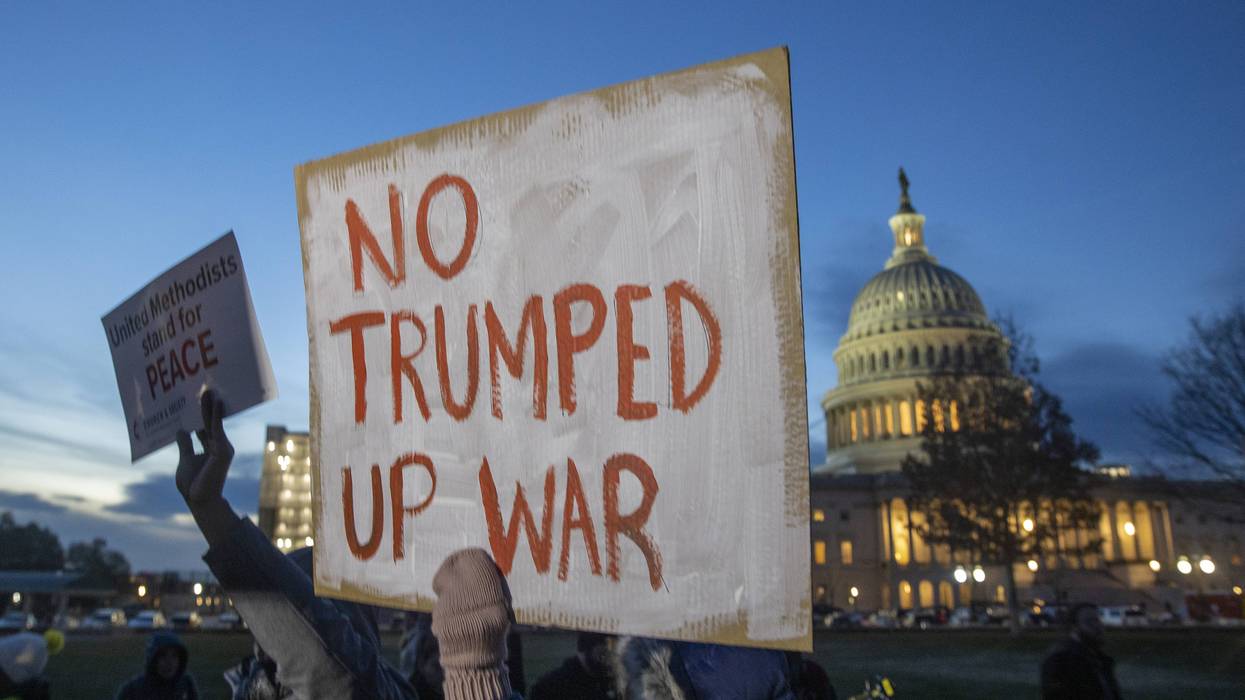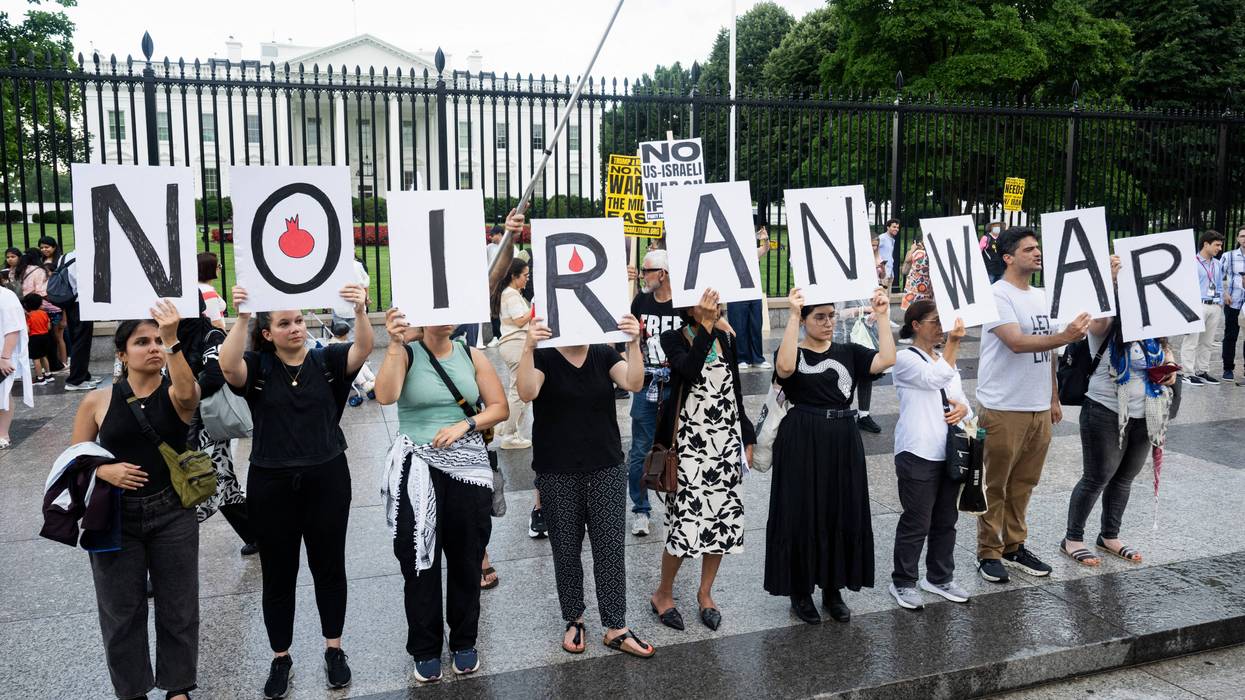There is a grave danger that the US government is preparing to exploit the genuine sympathy of people all over the world for the Iranian civilians massacred during protests in December and January as a pretext for an illegal military assault on Iran.
A new US war on Iran would be a cynical and catastrophic escalation of the crisis already swallowing its people, piling the unimaginable death and suffering of a full-scale war on top of many years of economic strangulation under US “maximum pressure” sanctions and the repression of the recent protests.
There is no good reason to sacrifice American soldiers and sailors in a war on Iran; no justification to kill Iranian troops for defending their country, as Americans would do if another country attacked the United States; no justice in killing Iranian civilians by turning their homes and communities into a new US war zone.
The world must act to prevent war, and the voices of Americans calling for peace and humanity may have an impact on President Trump and US politicians, in an election year when Americans are already sickened by US complicity in genocide in Gaza and the murderous paramilitaries invading US cities.
In a succession of speeches and in its National Security and Defense Strategy documents, the Trump administration promised a major shift in US foreign policy away from endless wars in the Middle East, to prioritize its ambitions to expand US power and coercion in the Americas and the Pacific.
But Trump is already following in the footsteps of the five US presidents before him, quickly abandoning his formal strategy goals and diverting America’s overpriced but impotent war machine back to the Middle East, to threaten or even attack Iran.
The renewed US threats against Iran have made it clear to Iran’s leaders that their symbolic strikes on Al Udeid air base in Qatar in June 2025, in retaliation for US strikes on nuclear facilities in Iran, were an insufficient deterrent to future US and Israeli attacks.
So Iran has signaled that it will respond to any new Israeli or US attacks with more deadly and destructive retaliation against US forces in the region. Foad Azadi at the University of Tehran reports that Iranian leaders now believe they would need to inflict at least 500 US casualties to successfully deter future attacks.
Iran’s leaders may well be right that Trump would have a low tolerance for US casualties and the political blowback he would suffer for them, if he should make the fateful choice to launch such an unnecessary and catastrophic war.
Iran has had many years to prepare for such a war. It has modern air defenses and an arsenal of ballistic missiles and drones with which to retaliate against US targets throughout the region, which include US bases in Qatar, Saudi Arabia, Kuwait, Bahrain and the UAE, and the flotilla of US warships loitering near, but not yet within range of, Iran’s shores.
The US is so far showing respect for Iran’s military capabilities, keeping the Abraham Lincoln at least a thousand miles from Iran’s coast, according to retired US Colonel Larry Wilkerson of the Eisenhower Media Network.
This cautious US naval deployment is a far cry from the six US carrier battle groups the US deployed to commit aggression against Iraq in 2003. The United States still has twelve “big-deck” aircraft carriers like the Lincoln and the Ford, but nine of them are in dock or unready for deployment. The USS George Washington, based in Japan, is now the only US carrier in East Asia, since the Abraham Lincoln left the Philippines in January to threaten Iran.
Standard deployments for these warships last only six or seven months, and their lack of readiness is the result of several years of overextended deployments, after which they need longer periods of maintenance and repair than the normal six to nine month turnaround time between deployments.
For example, since the USS Dwight D. Eisenhower completed a nine month combat deployment in the Middle East in January 2025, it has spent over a year in dock at Norfolk to repair the wear and tear it sustained in the failed US campaign against Yemen’s Ansar Allah (or Houthi) forces.
The United States and its allies bombed Yemen in successive campaigns under Biden and Trump, but failed to reopen the Red Sea and Suez Canal to Israeli or allied commercial shipping. As a result of the Yemeni blockade, most Western cargo shippers diverted their ships away from the Red Sea, forcing the Israeli port of Eilat into bankruptcy in July 2025.
Ansar Allah paused its blockade when Israel signed a ceasefire in Gaza in October 2025, but larger ships still avoid the Red Sea and insurance rates remain high, as Israel’s aggression and genocide continue to destabilize the region in unpredictable ways.
The US failure to defeat the much smaller Ansar Allah forces in Yemen is a small taste of what US forces would face in a prolonged war with Iran, which already inflicted significant damage on Israel during the twelve-day war in June 2025.
Iran used its older missiles and drones to deplete Israel’s air defenses. Then, once Israel began to exhaust its stocks of interceptors, Iran used newer, more sophisticated ballistic missiles to strike important military and intelligence headquarters in Tel Aviv and other military targets.
With Israel in trouble, the US entered the war directly, and bombed three nuclear enrichment sites in Iran, before agreeing to an Iranian ceasefire proposal on June 24, 2025. Israeli censorship has prevented a comprehensive public accounting of its losses in that war.
While overextended deployments have caused wear and tear to aircraft-carriers and other warships, US weapons transfers to its allies in Israel, Ukraine and NATO have depleted its own weapons stocks. This creates pressure on US leaders to hold off on launching a new war against a well-prepared enemy like Iran until it has replenished them, which could take a long time.
Meanwhile the war in Ukraine has exposed structural weaknesses in the US war machine. Russia has vastly out-produced the west in basic war supplies like artillery shells and drones, which has proven militarily decisive in Ukraine.
As Richard Connolly of the RUSI military think tank in London has pointed out, Russia did not privatize its weapons industry after the end of the Cold War, as the US and its allies did. It maintained and improved its existing infrastructure, which he called “economically inefficient until 2022, and then suddenly it looks like a very shrewd bit of planning.”
After the Cold War ended, on the initiative of Soviet leader and visionary peacemaker Mikhail Gorbachev, Russia’s economic weakness forced its military leaders to make honest, hard-nosed assessments of what it would take to defend their country in the post-Cold War world, and the shrewd planning that Connolly put his finger on is one result of this.
On the US side however, Eisenhower’s infamous “military-industrial complex” used its “unwarranted influence” to exploit the west’s post-Cold War triumphalism and expand its global military ambitions. Many Americans immediately recognized this as a dangerous new form of imperialism. Wiser heads among America’s political leaders and foreign policy experts predicted that the rest of the world would ultimately reject America’s new imperialism and be forced to confront it as a threat to peace.
The neoliberal privatization of US and western armament production turned it into an even more lucrative and politically powerful industry, which only reconfirmed Eisenhower’s warnings. Monopolistic military contractors have produced smaller quantities of increasingly expensive, technologically advanced warships, warplanes and surveillance systems. Despite wreaking catastrophic destruction in country after country, these weapons have proven impotent to prevent humiliating US defeats in its wars in Afghanistan, Iraq and Ukraine, and will likely prove just as useless in a major war with Iran.
The simplistic, linear thinking of Trump and his advisors leads them to believe that the solution to a trillion dollar per year war machine that can’t win a war is a $1.5 trillion per year war machine.
But this is nonsense. Russia has not defeated the US and NATO by outspending them. Quite the opposite. Since 1992, the US military alone has outspent Russia by fifteen to one ($26 trillion vs $1.7 trillion in constant 2024 dollars, according to SIPRI). Russia’s military superiority is the result of taking its own defense more seriously and confronting its problems more honestly than corrupt US leaders have ever tried to do since the end of the Cold War.
At a price tag of $17.5 billion, the USS Gerald R. Ford is the largest, most expensive warship ever built, costing more than the entire annual military budgets of most other countries. Making an even bigger warship for $26 billion would not make Americans any safer, just a bit poorer.
Relying on the offensive use of military force and record military spending to try to solve America’s problems has put the United States on a collision course with the rest of the world. In 1949, long before Eisenhower’s farewell speech in 1961, he offered some sage advice to politicians and pundits who were calling for a massive US attack on the USSR to prevent it from developing nuclear weapons.
Diplomacy does not mean holding a gun to someone’s head and demanding that they sign an unconditional surrender.
“Those who measure security solely in terms of offensive capacity distort its meaning and mislead those who pay them heed,” said Eisenhower. “No modern nation has ever equaled the crushing offensive power attained by the German war machine in 1939. No modern nation was broken and smashed as was Germany six years later.”
Unlike Iran today, the USSR was indeed working to develop nuclear weapons, but Eisenhower warned Americans against launching a new war that might kill millions to try to stop it.
As Eisenhower insisted, offensive military action offers no solutions to international problems. But diplomatic solutions are always possible. Diplomacy does not mean holding a gun to someone’s head and demanding that they sign an unconditional surrender. It means treating other people and countries with mutual respect and finding solutions that everybody can live with, based upon rules that we all agree on.
The UN Charter universally prohibits the threat or use of force and requires all countries to resolve disputes peacefully. So one country’s wrongdoing, real or perceived, is never a valid pretext for another country to threaten or use military force.
There is no good reason to sacrifice American soldiers and sailors in a war on Iran; no justification to kill Iranian troops for defending their country, as Americans would do if another country attacked the United States; no justice in killing Iranian civilians by turning their homes and communities into a new US war zone.
Could the stark choice our country is facing in Iran be a turning point, a moment when the American people will stand up and clearly, strongly say “No” to war, before our corrupt leaders can plunge Iran and the United States into yet another “Made in the USA” military catastrophe?


